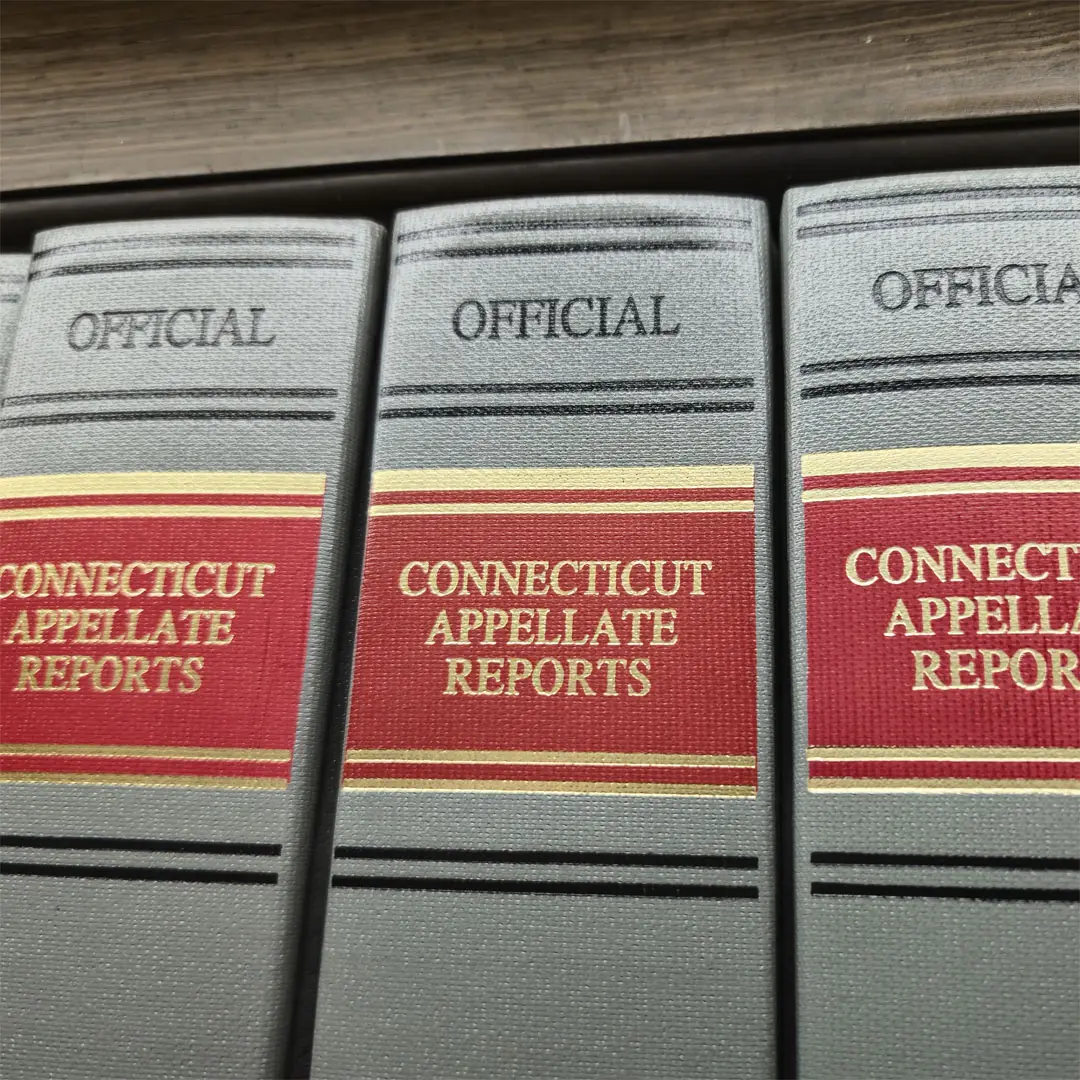Since launching Connecticut Appellate Law Firm, one of the most frequently asked questions I have received is: “How long does a Connecticut civil or family appeal take to resolve?”
In legal practice, the answer is often “it depends.”
Under typical circumstances and without any special motions or complexities, the process from filing an appeal to receiving a decision in the Connecticut Appellate Court generally takes 15-18 months.
If a party successfully petitions for certification to the Connecticut Supreme Court, the process essentially resets, adding an additional 15-18 months before receiving a decision.
Timeline for Civil Appeals and Family Appeals in the Connecticut Appellate Court
Civil appeals and family appeals, on average, take 15-18 months from start to finish in the Connecticut Appellate Court.
Once an appeal is filed, the deadline for submitting preliminary appeal papers—pursuant to Practice Book § 63-4 —begins immediately. Parties then must order and wait to receive the transcripts, which can take weeks to months. Briefing begins only after all parties receive either the transcripts or the clerk’s appendix, whichever occurs later.
In civil and family appeals, the briefing process usually takes 6-8 months, which includes researching, drafting, and filing the appellant’s main brief, the appellee’s main brief, and the appellant’s reply brief.
Note: Although the Connecticut Rules of Appellate Procedure do not require a reply brief, filing one is almost always advantageous. Not filing a reply brief may shorten the appellate process, but failure to do so may compromise your position.
After all briefs and appendices are filed, the case is marked “ready,” for scheduling oral argument—usually within 1-2 months at the Connecticut Appellate Court.
After argument, parties await a decision. On average, the Connecticut Appellate Court takes 3-5 months to render its decision.
Timeline for Civil Appeals and Family Appeals at the Connecticut Supreme Court
Assume for this section that a party is before the Connecticut Supreme Court after a successful petition for certification to appeal (and not, for example, after filing a public interest appeal, filing an appeal directly to the Supreme Court based on original jurisdiction, or following transfer from the Appellate Court to the Supreme Court).
This process, again, takes on average 15-18 months.
Why does the process take the same amount of time, even though the parties already received the transcripts and briefed the appeal in the Appellate Court?
Although parties already received the transcripts and completed a round of briefing and oral argument at the Appellate Court, briefing an appeal in the Supreme Court requires new research and briefing focused on the Appellate Court’s decision. Additionally, the Connecticut Supreme Court typically takes 6-9 months (compared to the Appellate Court’s 3-5 months) to render a decision, with split opinions taking additional time.
Factors that May Extend the Appellate Process
I previously described a straightforward civil appeal or family appeal with no complications or delays. But that rarely is the case. So, what factors or events tend to prolong the appellate process?
Transcripts
The first factor that can extend the appellate timeline is ordering and receiving the transcripts. Depending on the size of the record, parties can expect transcript delivery to take anywhere between 30-60 days in civil and family appeals. (Note: For criminal and habeas appeals, this process usually takes several months longer)
Preargument Conference
If both parties agree to participate in the preargument conference (PAC) program, appellate clerks will stay briefing until after that process concludes. Often, the PAC leads to a settlement or transfer to the Supreme Court, when appropriate. When it does not result in a settlement, briefing resumes.
Cross Appeal
Once a party appeals, the appellee has 10 days to file a cross appeal if they also are aggrieved by the judgment. Cross appeals introduce additional issues and require longer, more detailed briefs, which can prolong the appellate timeline.
Motions
Substantive appellate motions add weeks to months—or even years—to the overall timeline, depending on the specific motion.
Motions for Articulation and Rectification:
Motions for Articulation and Motions for Rectification, typically filed by the appellant, request that the trial court clarify its decision or amend the record by adding, correcting, or deleting information. Because trial court response times can vary—often taking several months—these motions can significantly extend the appellate timeline.
Appellate Note: As an appellant, do not let potential delays deter you from seeking an articulation. It is the appellant’s responsibility to provide an adequate record for review. Providing an adequate record is preferrable to an appellate court declining to review your appellate claims for lack of an adequate record.
Motions for Review:
If a party is dissatisfied with the trial court’s decision on a motion for articulation or rectification, they may file a motion for review with the appellate court. This process—drafting, filing, and receiving the court’s decision—can add 2-3 months to the overall timeline.
Motions to Stay Briefing:
If you discover that a similar issue is pending before the Connecticut Supreme Court while preparing your appellate brief, you may file a Motion to Stay Briefing. This motion pauses the briefing process until the Supreme Court issues a decision. (Note: Occasionally, the Court, itself, will stay briefing until resolution of an issue in the Supreme Court.)
Notice of Statement of Decision:
When the trial court issues an appealable order without a written decision, a party may file a Notice of Statement of Decision. This prompts the trial court to issue a full decision (or in some instances, the Appellate Court to order the trial court to issue a decision). This process can take weeks to months.
Motions for Extension of Time
Given the demanding caseloads of attorneys, motions for extension of time to complete briefs are common, especially in cases with lengthy or complex trial records. These motions further extend the appellate timeline.
Average Time to Appeal in Connecticut
In summary, a straightforward civil appeal in the Connecticut Appellate Court takes approximately 15-18 months. If the appeal is certified to the Connecticut Supreme Court, expect an additional 15-18 months. This amounts to a total estimated timeline of about 30-36 months from start to finish.
Note: This timeline constantly is in flux. Things like a change in Chief Judge or Chief Justice, the overall makeup of the court, the ebbs and flows of the court year, and even a global pandemic can impact the average length of an appeal. These averages also differ based on practice area, age of the appeal, and complexity of the case.
The Benefits of Hiring an Appellate Attorney
Handling an appeal is a complex, lengthy process that often spans multiple court years. Consulting with an experienced appellate attorney can provide you with a tailored estimate for your case’s timeline, helping you decide whether to file an appeal and set realistic expectations for when a decision might be reached.
If you have questions about your appellate timeline or would like to discuss your case, please feel free to contact me. I am here to offer insights and support tailored to your busy practice.


